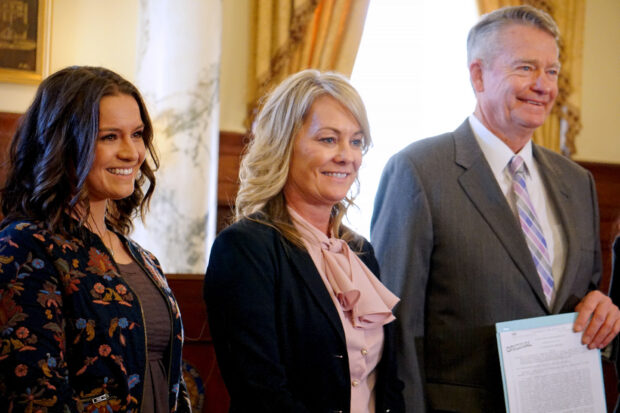Idaho’s minimum teacher salary will increase to $40,000 in 2020-21, thanks to a bill Gov. Brad Little signed Wednesday afternoon.
Shortly before 3:15 p.m., Little signed House Bill 153 into law. Little made increasing teacher salaries a campaign promise last year, and pushed for it in his first State of the State address in January.
“This bill is part of my overarching goal making sure our kids in Idaho stay in Idaho,” Little said. “We’ve got a long ways to go, but this is a good start right here.”
Idaho’s current minimum teacher salary is set at $35,800. Under the new law, the minimum salary will increase to $38,500 next year and $40,000 the following year. Little also included funding to increase pay within the second and third “rungs” on the career ladder so teacher pay won’t decrease after their first year.
Salaries and benefits are negotiated locally each year, but state law sets the minimum salary for all public school and charter teachers.
Several teachers and education advocates, legislators and Superintendent of Public Instruction Sherri Ybarra surrounded Little as he signed the bill.

Jessie Spurgeon, who teaches at Boise’s Koelsch Elementary School, thanked Little and the Legislature for investing in recruiting new educators.
“This is an important day for professional educators across Idaho,” she said.
Like Little, Spurgeon called it a good first step. Now in her seventh year of teaching, Spurgeon won’t directly benefit from the new law. She encouraged Little and the Legislature to invest in pay increases for veteran teachers, who often mentor and support beginning educators.
Sam Stafford, who teaches at Boise’s Borah High School, also welcomed news of the higher minimum salary. In fact, he said the issue of recruitment and retention hits close to home for him and his colleagues. Stafford worked with a gifted computer science student teacher who loved the subject and loved working with kids. But he ultimately took an industry position because he couldn’t support his family on the starting salary that was offered a year or two ago.
Passing the new law sends a positive message to prospective educators and will make a difference for their bottom lines, Stafford predicted.
“It’s a wonderful profession,” he said. “Knowing that the Legislature is supportive makes a big difference.”
It will cost the state about $3.8 million to implement the minimum salary increase in 2019-20 and another $7.7 million in 2020-21.
K-12 budgets signed into law
In other news, Little has also signed the seven public school budget bills into law.
Taken together, the budgets increase general fund spending for K-12 by 6.1 percent, or $109 million.
Budget highlights include:
- $49.7 million to pay for the fifth year of educator raises under the career ladder salary law.
- $14.6 million in new funding for discretionary spending for school districts, a funding source sometimes referred to as discretionary spending.
- $13.1 million in new funding to expand Idaho’s K-3 literacy initiative, one of Little’s top education priorities.
- $7.3 million to give school administrators a 3 percent raise.
- $7.2 million to pay for financial incentives known as master educator premiums, which are designed to reward Idaho’s most effective veteran educators.
Little announced the budget signings during the ceremony to celebrate the new minimum teacher salary law. By Wednesday afternoon, the Legislature’s website reflected that all seven 2019-20 education budgets had also been signed into law.
Teach for America bill amendment
The House Education Committee signed on to a Senate amendment to a bill allowing nontraditional teacher preparation programs to partner with schools and seek state funds.
The amendment to House Bill 93aaS places several stipulations on a nontraditional teacher prep programs, such as Teach for America and ABCTE. Under the amendment, the amount of state funding shall not exceed 25 percent of each teacher’s annual salary. Furthermore, funding would be limited to two years per teacher, and the local school or charter partner would need to pitch in 10 percent of the funding the state does.
Late Wednesday afternoon, the full House signed on to the Senate amendments as well. The bill passed the Senate unanimously on Monday.
Charter school facilities funding
House Education also signed off on a bill designed to help charter schools obtain lower interest rates when they go out to bond for facilities.
If passed, Senate Bill 1180 would create a new state fund designed to give lenders confidence that there is a safeguard against a potential missed payment.
Sponsoring Rep. Gayann DeMordaunt, R-Eagle, said the program would help charters obtain lower interest rates. By spending less on interest, charters would be able to save money or invest it in the classroom.
SB 1180 now heads to the full House with a recommendation it passes.
Schools as polling places
The House on Wednesday passed a bill designed to make public schools available as election polling places.
DeMordaunt, House Bill 270’s sponsor, pointed out that many public schools already serve as polling places. But she said clerks in Bonneville, Canyon and Bannock counties pushed for the change after saying they faced some challenges using schools as polling places.
DeMordaunt said schools are public schools that are reliably situated throughout residential areas where voters live, making them natural polling sites.
HB 270 passed the House 61-7. It heads to the Senate.
Career technical education budget
Working quickly, the Senate unanimously approved the 2019-20 Division of Career Technical Education budget Wednesday.
The budget bill includes $68.5 million in state general fund spending, a 3.1 percent increase.
Nobody debated against the budget, which was passed quickly by unanimous consent instead of a more formal roll call vote.
The budget passed the House 61-7 on March 14. It heads to Little’s desk for final consideration.
